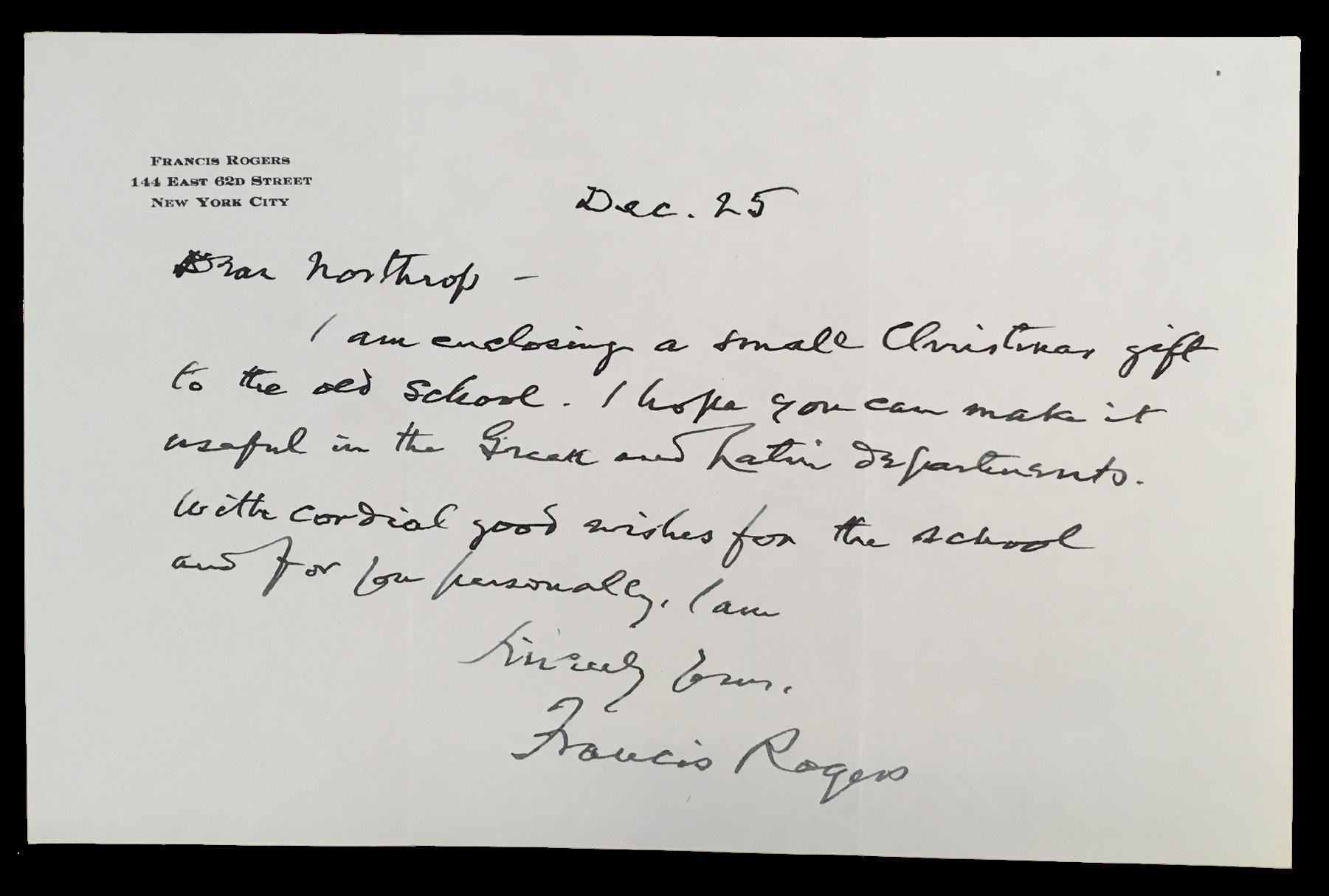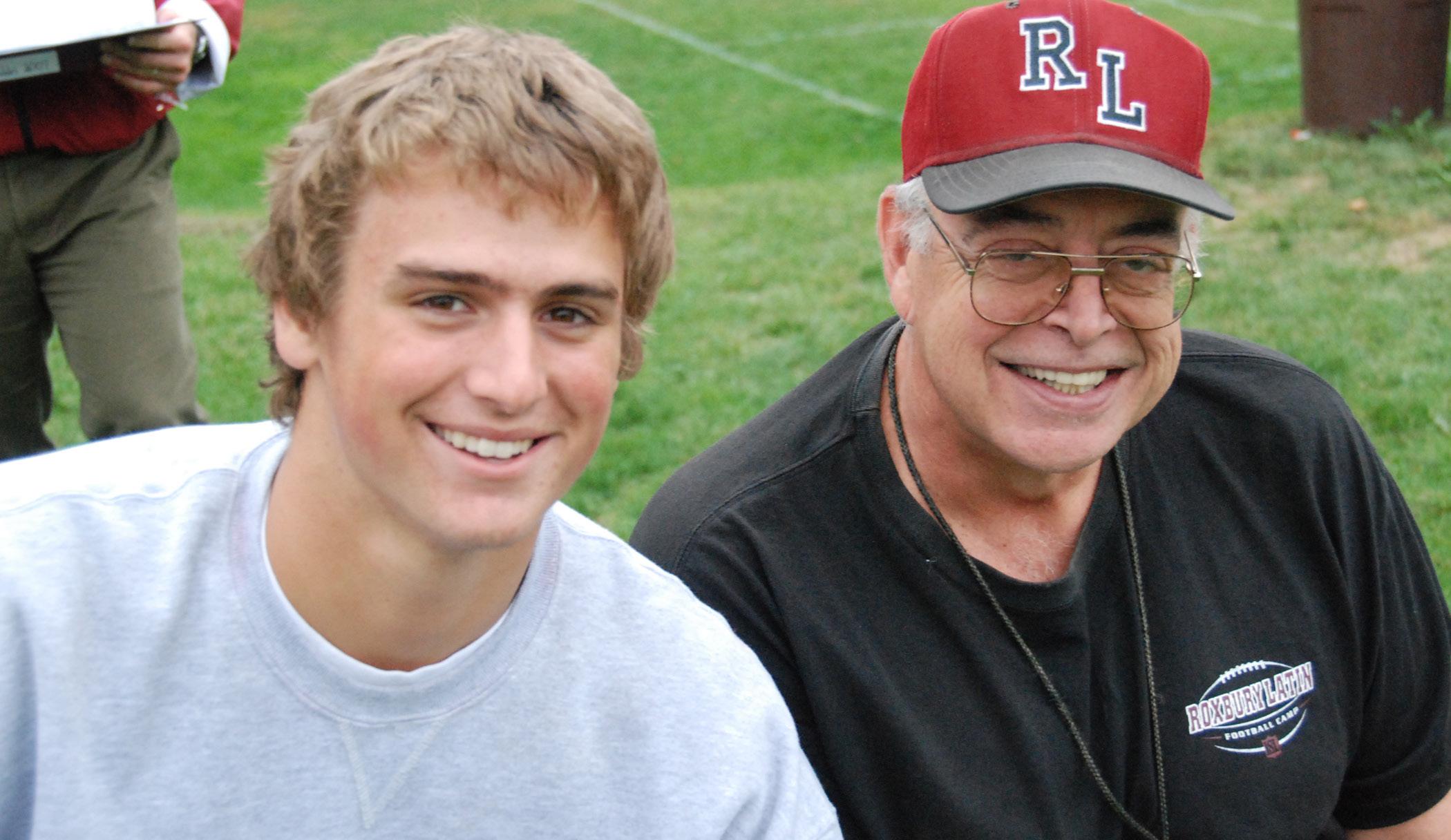
34 minute read
Class Notes
Charles Halsted ’54 reports, “After two years at RLS, my family moved to Los Angeles where I completed high school. With my rigorous RLS standards of scholarship, I attended Stanford where I majored in modern European history with a minor in pre-med. After spending the summer of 1958 hitchhiking through western Europe, I obtained my medical education at the University of Rochester School of Medicine, followed by internship and residency training at the Cleveland Metropolitan General Hospital. My two-year military obligation was spent performing clinical research at the U.S. Naval Medical Research Unit in Cairo, Egypt, where I witnessed firsthand the Arab/Israeli War of 1967. Subsequently, I completed specialty training at Johns Hopkins and embarked on a career in academic medicine. Due in large part to my scholarship grounding at RLS, my medical research output exceeded more than 200 original research papers, book chapters, and reviews up until my retirement five years ago. Since then I have embarked on a new career in poetry, with two published books, a third in press, and two more ready to go early next year. Looking back I can fairly attribute most, if not all, of my achievements to the intellectual grounding I received at The Roxbury Latin School.”
John Kenney ’81 published his fourth book of poetry titled, Love Poems (For the Office…or Wherever). John reports, “My publisher is calling it ‘the wrong book for the wrong time by the wrong author,’ which I’m excited about.”
Advertisement
The photography of Chris Payne ’86 was featured in a double spread of The New York Times Magazine on November 28, 2020 for a feature, How to Make a Guitar, documenting the Martin Guitar factory for The New York Times for Kids publication.
Tino Poggio ’96 is a professor of physics and chair of the Physics Department at the University of Basel, where he leads a group focusing on nanomechanical sensing, nanomagnetism, and sensitive scanning probe microscopy. Tino is a winner of a 2013 ERC Starting Grant and serves on the board of the Swiss Nanoscience Institute.
Tim Pingree ’02 and Lucas Robertson ’00, co-founders of SHAKE Architecture: Construction, were featured on the cover of The Boston Globe Magazine in October, for a recent renovation project in Charlestown. Zack Hardoon ’05, Kevin Mullin ’10, and John Noonan ’10 have worked in the past at SHAKE with Tim and Lucas.
John Lawrie ’03 and his wife, Courtney, welcomed their first child on November 28—a boy, John Robert Lawrie, III. Mom, Dad, and baby Jack are all doing well.
Richie Iskra ’08 shares that his “extraordinary wife, Tatum, gave birth to a baby boy—Samuel Patrick—on October 29. Mum, Dahd and Big Sister, Etta, are all happy and healthy.”
Rishabh Sinha ’08 and Simran Virk were married in a small, COVID-safe ceremony with parents and siblings present, overlooking the Pacific Ocean in Southern California. The couple looks forward to having a big wedding celebration in 2022. //



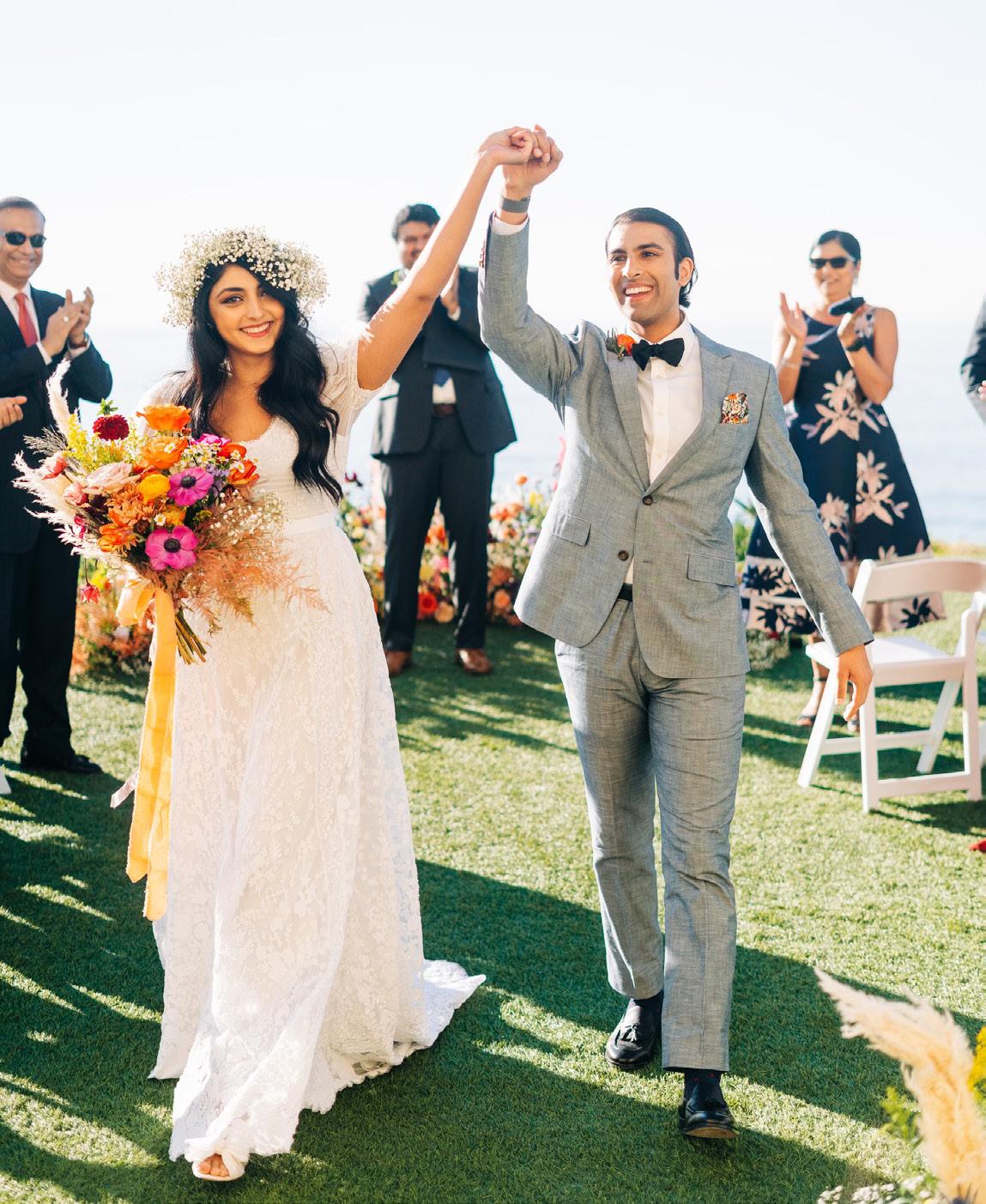
The RL Alumni in Education Group met on November 12 via Zoom to discuss ways to maintain motivation and morale in the midst of hybrid and remote learning. Participants included Jean-Pierre Jacquet ’01, Jakub Lau ’02, Peter Simpson ’01, David Hershenson ’51, James Colbert ’56, Richard Bloom ’67, Greg Spiedel ’06, Mike Lawler ’06, Daniel Wulf ’88, Sam Fitzgerald ’07, Michael Bear ’77, Luke Joyner ’05, Alessandro Ferzoco ’14, Tom Guden ’96, Dave Cataruzolo, and Headmaster Kerry Brennan.
The RL Alumni Commercial Real Estate Group met via Zoom on December 2. Participants included Dan Botwinik ’98, Colin Flynn ’01, Jeffrey Ganem ’77, Jacob Grossman ’00, David Grossman ’97, Chuck Katz ’80, Peter Mahoney ’98, Paul Massey ’78, Mike McElaney ’98, Joe Mulligan ’83, Jerry Murphy ’01, Bob O'Connor ’85, John O’Loughlin ’08, Greg Petrini ’82, Michael Price ’77, Dan Rea ’05, Chad Reilly ’85, Sean Rose ’15, Alan Schlesinger ’64, Mike Shepard ’12, John Thomsen ’15, Jordan Warshaw ’83, Alessandro Ferzoco ’14, Tom Guden ’96, and Dave Cataruzolo.
The RL Alumni Council held its quarterly meeting on January 21.
In honor and in place of RL Homecoming, the 1970 Roxbury Latin Football Team via Zoom on Wednesday, October 21, celebrated the 50th Reunion of their Prep School Championship season. The fourteen teammates were joined by current RL football coach Mike Tomaino. Present were Brian Crowley ’71, Steve Kaitz ’71, Roger King ’71, Dan Williams ’71, Jonathan Olch ’71, Charles David Lee ’72, Mark Rubin ’71, John Rodman ’71, Bob Allen ’71, Jim Hill ’72, David John ’72, Steven Simoni ’71, Dick Carroll ’72, Bill McCarthy ’71, and Dave Cataruzolo (adjacent photo: Dan Williams ’71, Jonathan Olch ’71, Steven Kaitz ’71, and Roger King ’71).

In place of the typical Young Alumni Holiday Party that Headmaster Brennan hosts each winter season, the Alumni Office sponsored two young alumni calls to connect classmates, to share an update of the school, and to provide information about professional and networking opportunities and resources. At the end of each call, the Alumni Office passed the hosting privileges to a member of the class so that the conversation could continue among peers in a more informal fashion.
The Class of 2017 Holiday Gathering was held via Zoom on December 29. Attendees included Joe Lomuscio, Fran Rose, Andys Gonzales, Michael Rounds, Oliver Booth, Mike Healy, Mike O’Grady, Aidan Burke, Neema Zarrabian, Felix Wang, Adam Banks, T.J. Silva, Hamilton Coiscou, Jack Ricciuti, Chris Jimenez, Andrew Talcott, Darcelis Worrell, Ian Kelly, Jack Colavita, and Xander Boyd.
The Class of 2018 Holiday Gathering was held via Zoom on Dec 30. Attendees included Zach Milton, Jake Wexelblatt, Dylan Zhou, Grady Hayes, Zach Levin, Harris Foulkes, Ahmed Abdelrahman, Will Connaughton, Zander Keough, Andrew White, Reis White, Conor Dowd, Tyler Wolfe, Gabriel Grajeda, Ayinde Best, Evan Lim, Eoghan Downey, Carson Straub, Andrew Steinberg, Robert Crawford, Cole Englert, John Philippides, Matt Sheehan, and Ben Lawlor. //
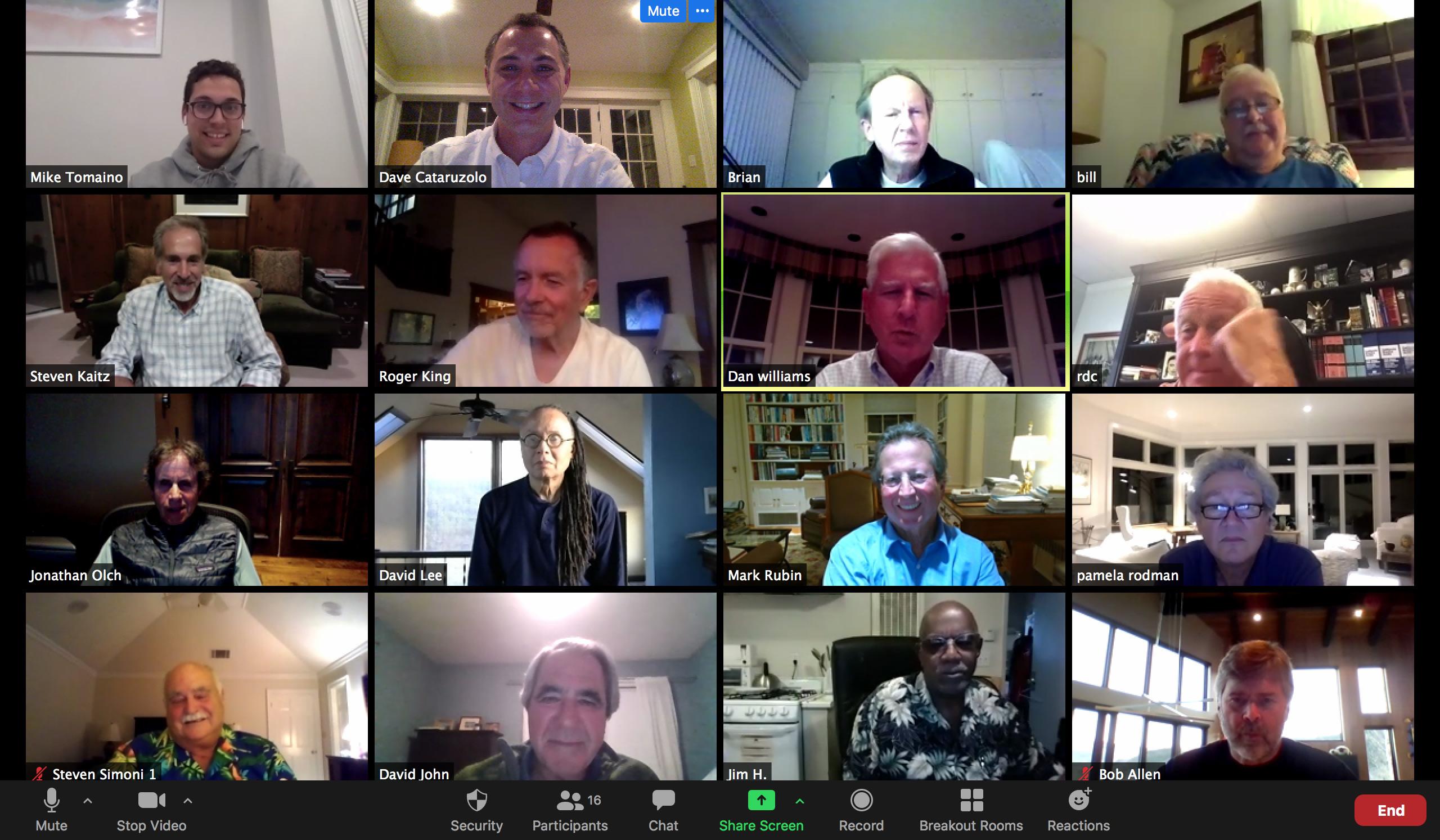
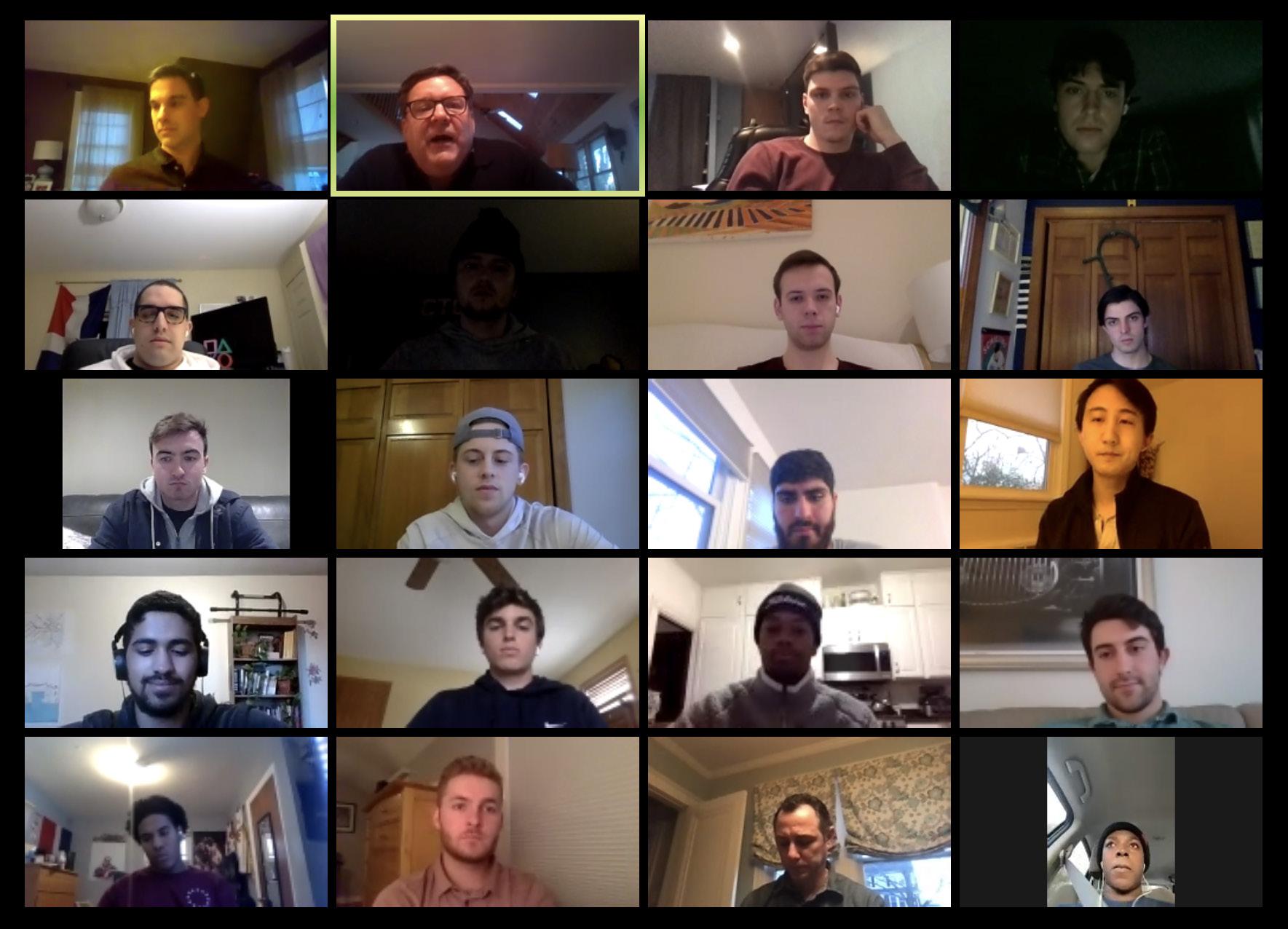
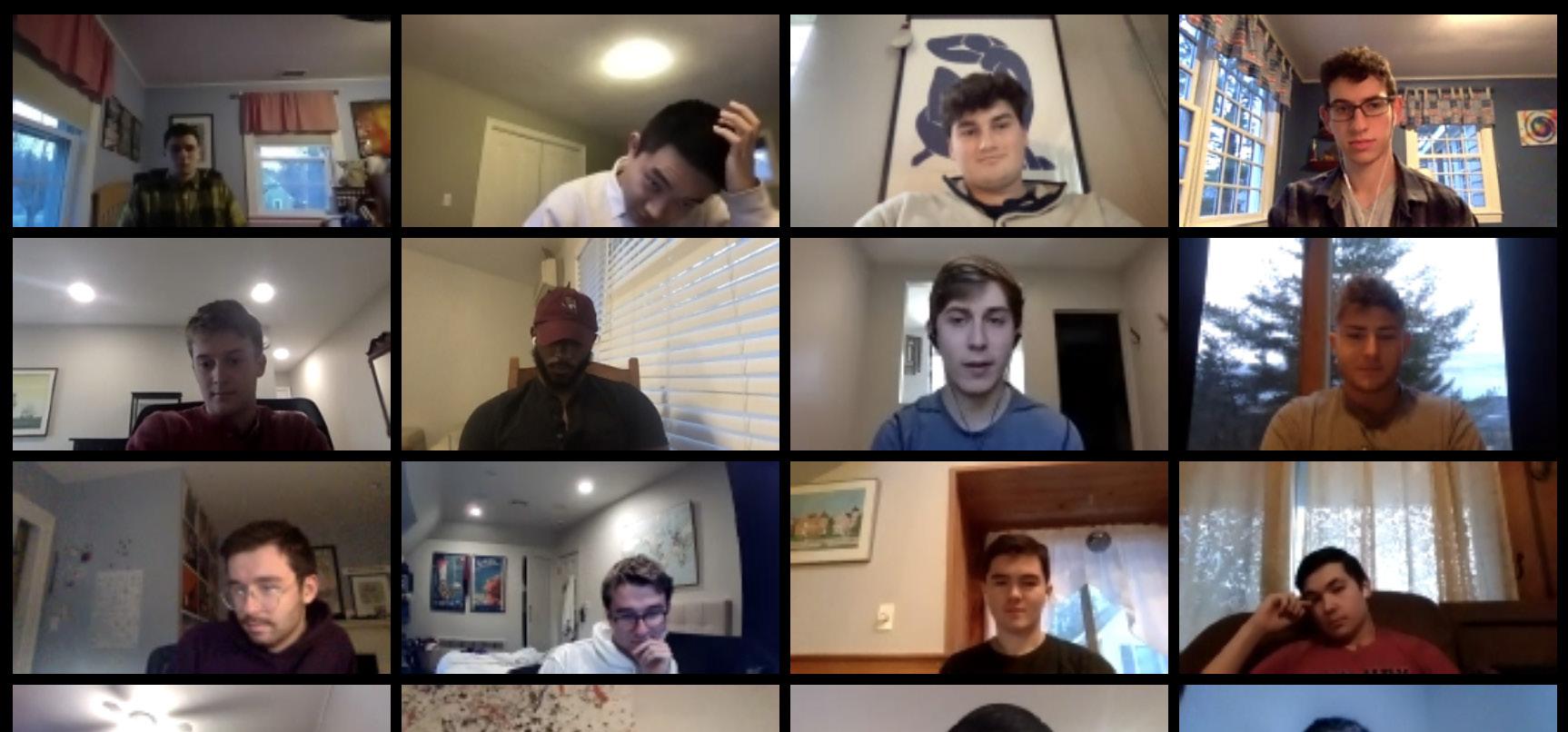
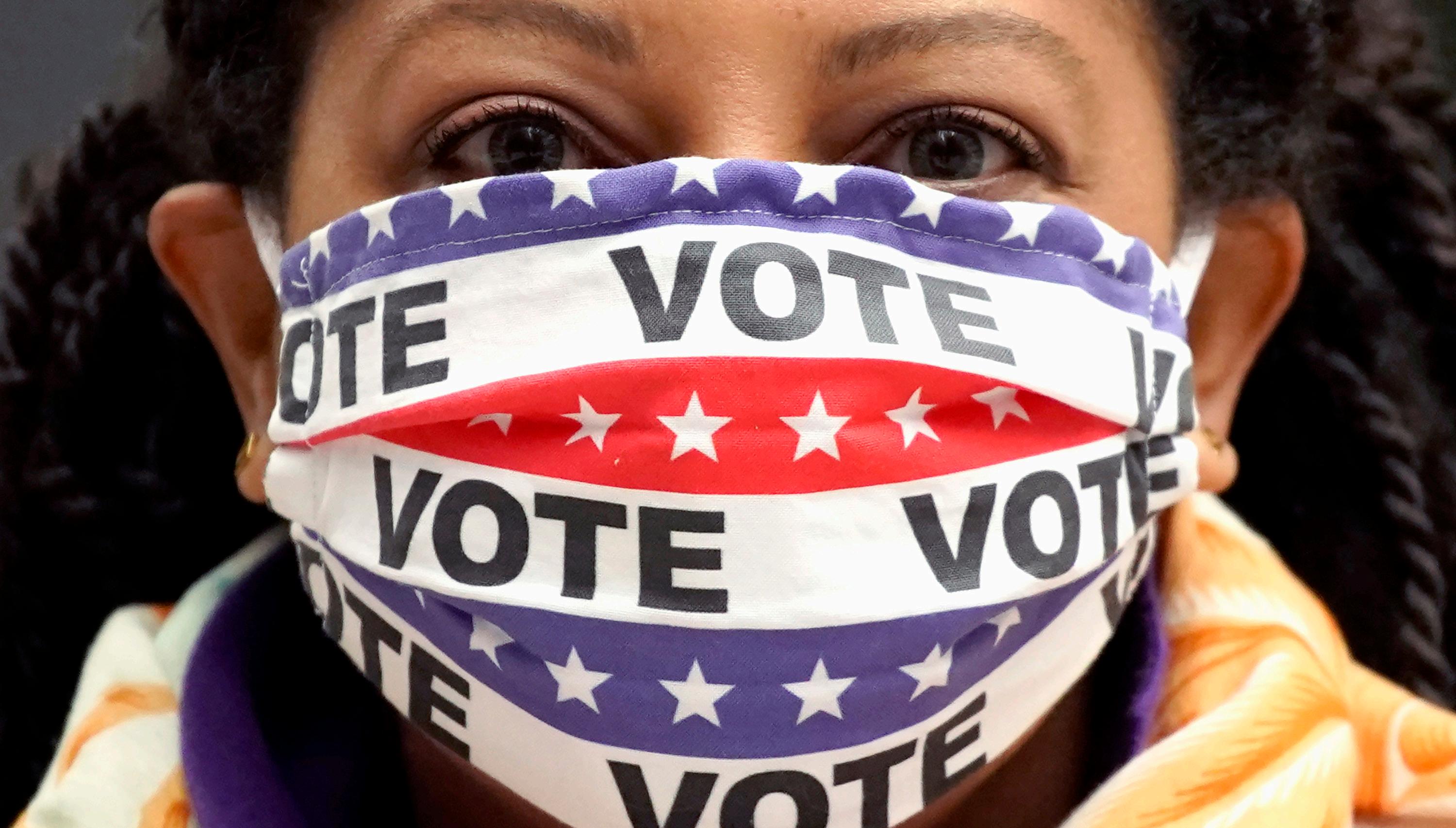
Civil rights activists remind us: There is no democracy without the right to vote
by PETER G. MARTIN ’85
We are honored to reprint this article by alumnus Peter G. Martin ’85—about his alumnus father Gordon A. Martin Jr. ’53, a former member of the Board of Trustees, who pursued racial justice as a Gordon A. Martin, Jr. lawyer and a judge beginning in the 1960s, when he worked in the U.S. Justice Department’s Civil Rights Division in Mississippi. Gordon made it possible for one of the movement’s great litigators, John Doar, to speak to the school several years ago. This article originally appeared on November 2, 2020 in America: A Jesuit Review. Peter serves as Special Assistant to the President of Boston College, after more than 20 years spent in the U.S. Foreign Service. Peter’s two sons currently attend Roxbury Latin—Nicholas, Class III, and Xavier, Class V. In October 2016, I came home from my diplomatic assignment overseas to see my father, Gordon A. Martin Jr., whose health was failing rapidly. It was during the lead-up to the presidential election, and he was worried about the trend he was seeing toward voter suppression, especially among people of color.

He was particularly sensitive to this issue, as he had spent much of his career in the pursuit of racial justice as a lawyer and a judge. This began in the 1960s, when he worked in the U.S. Justice Department’s Civil Rights Division in Mississippi. It was there that he helped bring to trial the United States vs. Theron Lynd case in 1962, an important step toward the passage of the landmark Voting Rights Act of 1965.
My father always told me the heroes of U.S. vs. Lynd were the brave African-American witnesses who came forward at great personal risk to demonstrate the unfair voter registration practices that had made Forrest County, Mississippi, one of the most egregious examples of white
supremacist rule in all of the South. He later wrote a book about their stories, Count Them One by One: Black Mississippians Fighting for the Right to Vote, which includes many of the details recounted below.
The county’s registrar of voters (Theron Lynd at the time of the lawsuit and Luther Cox before him) was the omnipotent arbiter of voting rights, and he systematically excluded Black citizens from the voter rolls with a combination of avoidance, hostility, cynicism, and dishonesty. In 1961, 30 percent of the county’s population of roughly 53,000 was Black, but the Justice Department found only a dozen African-Americans registered to vote.
White voters breezed through the registration process. If they were asked to interpret a section of the Mississippi Constitution (state law gave the registrar the right to demand this), they never seemed to have a problem with it. The women who worked as clerks in the registrar’s office often took care of the white applicants. But they were instructed that only registrar Theron Lynd could see the Blacks.
Prospective Black voters were often told Lynd was “not available” or to “come back later.” If, after long periods of waiting, they finally saw Lynd, he might tell them there wasn’t enough time left that day to fill out the paperwork. If he did allow a prospective voter to apply, he or his clerks were often able to find an error that invalidated the registration. Perhaps the applicant had signed in the wrong place or had written down the wrong precinct number. Lynd’s predecessor had his own favorite question for Black registrants to determine if they were qualified to vote: “How many bubbles in a bar of soap?”
“Unqualified” was invariably Lynd’s verdict. Would-be voters were told they could come back in six months to try again. As John Doar, my father’s lead prosecutor for the Lynd case, put it: “No matter how educated a black person was in Mississippi, it was very unlikely that he would get a chance to vote. [But] if you could breathe and you were white, you voted.”
David Roberson was a Black college graduate and a Korean War veteran when he came to Forrest County to teach science at Hattiesburg’s segregated Rowan High School in 1958. He saw that out of the 27 teachers at Rowan, including “10 or 11 [with] master’s degrees,” very few had successfully registered to vote. “How can we be qualified to teach, yet we’re not qualified to vote?” Roberson asked.
Lynd rebuffed Roberson several times. He “had a real sour personality,” Roberson later told my father, “sour in the kind of stare he gave you when you walked in: What are you doing here? You have no right to even request to register to vote.”
Roberson persevered, ignoring the threat of violence against Blacks who tried to exercise their legitimate rights. When he had a chance to work with the Civil Rights Division on a lawsuit, he later said, “We really couldn’t believe it, because in our whole lives, none of us had ever experienced any kind of thing like that from the government, where the results might be some positive advance for Blacks.”
Roberson, who passed away in May at the age of 86, was just one of the brave witnesses in the Lynd case:
• Addie Burger, another teacher, had studied at Alcorn State and New York University. In response to the section of the Mississippi Constitution Lynd gave her, she wrote an eloquent statement on the duties of citizenship. It took her several days to track down Lynd in his office to get an answer from him. “Unqualified,” he told her. Burger testified in the trial that when she asked Lynd where she had gone wrong, he walked away without a word.
• T.F. Williams was a World War II veteran who worked at Hattiesburg’s Hercules Powder Company. He had first tried to register under Luther Cox, who repeatedly kept him waiting and told him to come back another time. Lynd disqualified him when he took out a pocket dictionary to look up one of the words in the passage of the Constitution he was given.
• Sherman Jackson, a custodian at Hercules, was told to interpret the phrase “duties and obligations of citizenship.” He wrote: “Uphold and defend all laws of city, county and state government.” Not qualified. One of Jackson’s sons went to the courthouse when his father testified in U.S. vs. Lynd. He was turned away by the police and didn’t get the chance to see his father take the stand.
• The Rev. Sam Hall repeatedly tried to register, but to no avail. When the Forrest County defense lawyers implied that he was a pawn of the U.S. Justice Department and that he had been pressured to come to the courthouse in Jackson, he defiantly told them, “I came to Jackson today myself.”
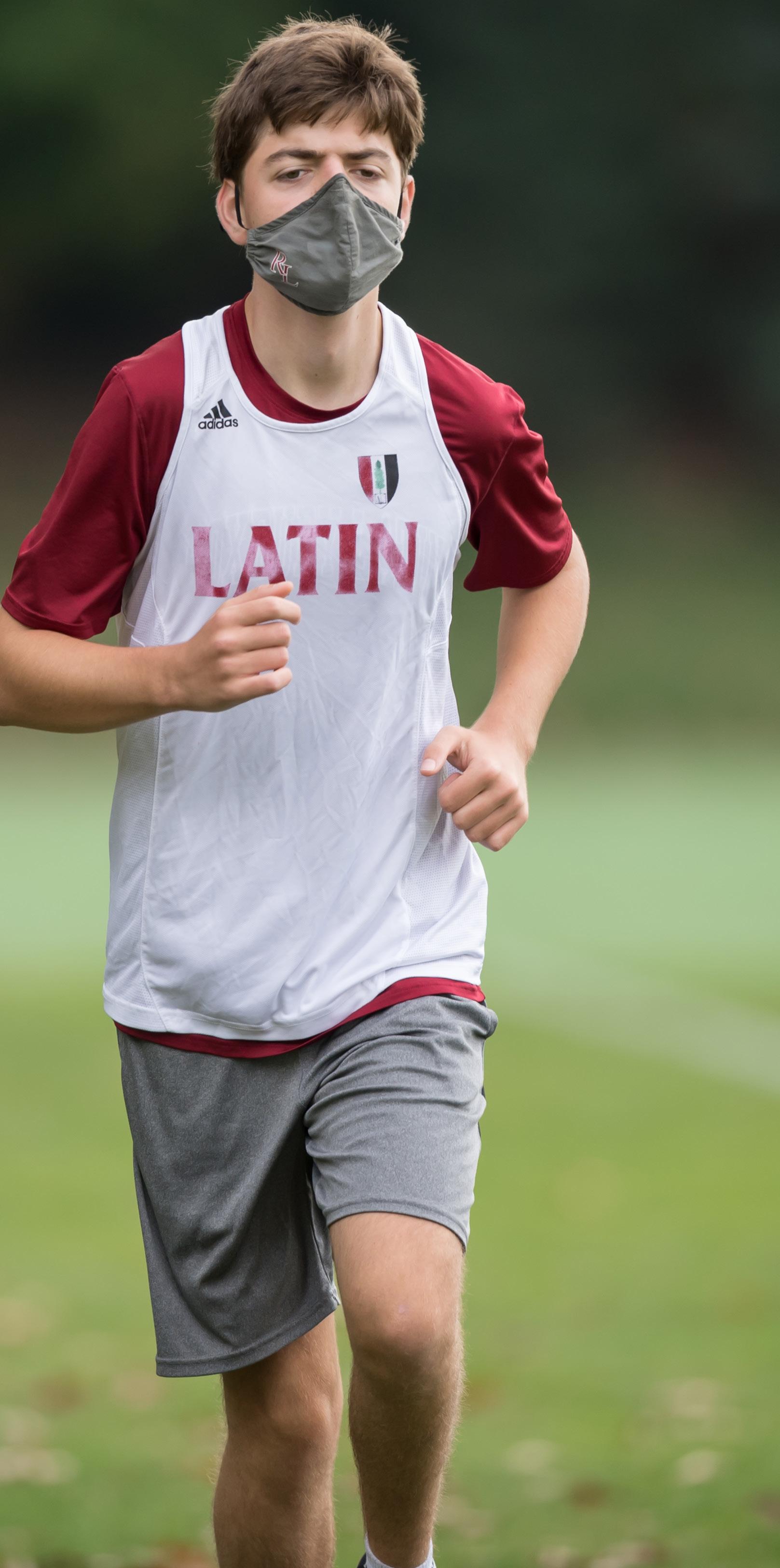
As I sat with my father in 2016, I did not fully appreciate the extent of the ongoing challenges to voting rights that worried him. I had tended to regard the election of an AfricanAmerican president as symbolizing the triumph of the civil rights movement. But my father’s perspective was like that of others who had been in the trenches. He knew the fight was not over.
As civil rights icon John Lewis expressed just before his death earlier this year: “Voting and participating in the democratic process are key. The vote is the most powerful nonviolent change agent you have in a democratic society. You must use it because it is not guaranteed. You can lose it.”
My father died in late 2016. He was spared from having to see the further restrictions to voting rights in this country that have occurred over the last few years. I hope the example of the freedom fighters he worked with inspires today’s voters to do anything they can to have their ballots counted and continue a struggle that is clearly not over. // Going Above and Beyond for Faculty
On March 4, 2021, Roxbury Latin will host the school’s third annual Giving Day—24 hours in which we will ask alumni, parents, students, faculty, staff, and friends to express their love for and belief in RL by making a donation, of any amount. We are dedicating the upcoming Giving Day to our talented and dedicated faculty who continue to go above and beyond to advance RL’s mission. While we hold our annual Exelauno Day competition on campus, we hope that you will “March Forth” with us by making a gift, telling your friends, and spreading the word on social media. Please join us by taking part in this exciting day and expressing what Roxbury Latin means to you.
Call for Trustee Nominations
The Committee on Trustees is seeking recommendations from any member of the Roxbury Latin community for trustee candidates to serve a six-year term on the Board of Trustees. Please forward such recommendations by March 1 to the Committee on Trustees at nominations@ roxburylatin.org.
Annual Fund Update
The 2020–2021 Annual Fund is making great progress toward achieving its goal of $3,800,000 thanks to the generosity of our alumni, parents, and friends. We have already received gifts and pledges totaling $3,085,321. We are 81 percent of the way there, but we still need your help!
Thank you to all who have already made a commitment to the 2020–2021 Annual Fund. If you have not yet contributed, please consider supporting Roxbury Latin. Every gift helps RL maintain tuition that averages $16,000 less than that of other local independent schools. Every gift helps bridge the $26,350 gap between the cost of tuition and the actual cost of an RL education. Every gift supports the admission and enrollment of qualified boys, regardless of their family’s ability to pay, and every gift helps retain and attract a faculty that is second to none.
Gifts, large and small, from each and every donor, make a tremendous difference to the talented young men who study here. Please join your classmates, fellow parents, and friends by making a gift today. Thank you for doing your part to ensure that Roxbury Latin can preserve its distinctive quality and character. //
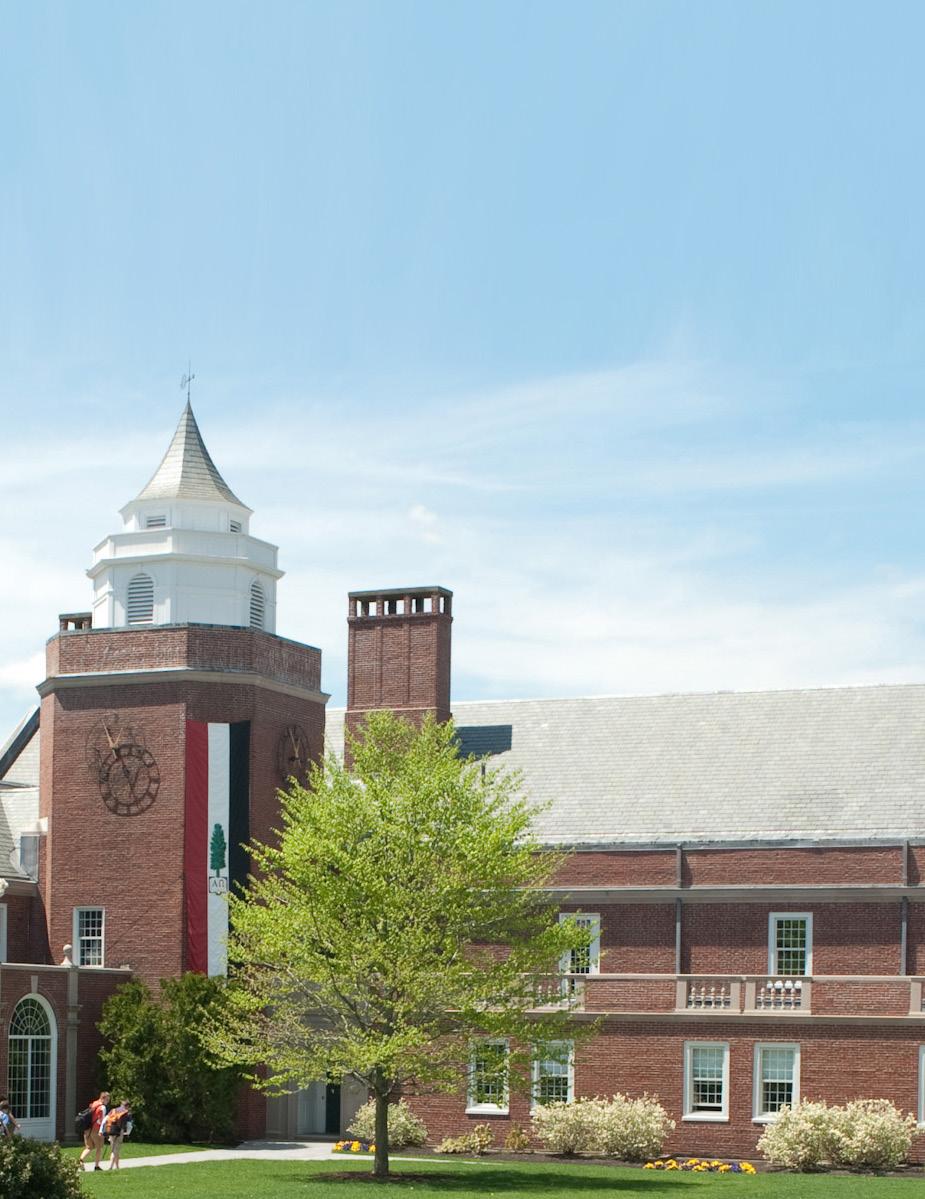

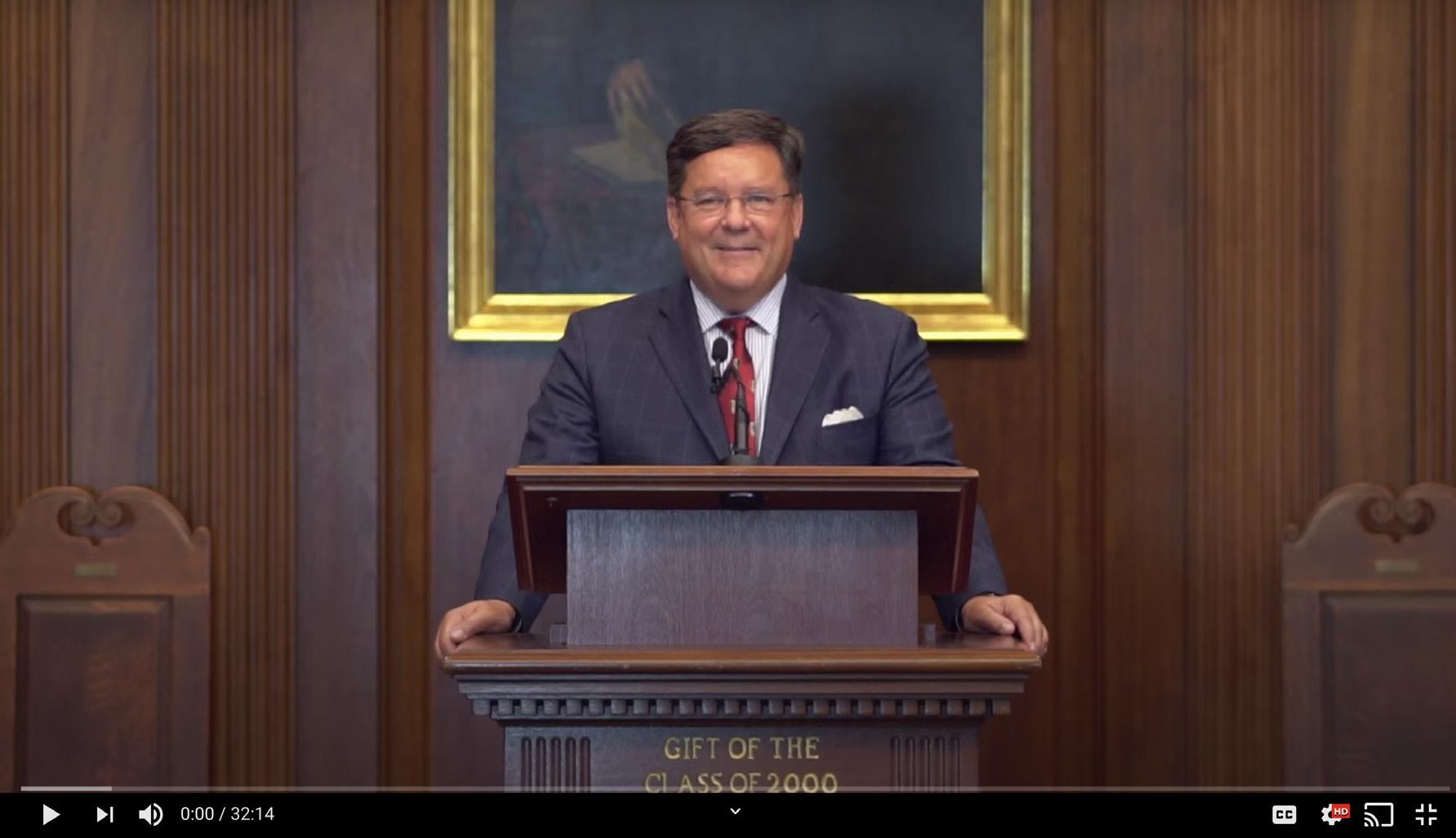
Stories to Kick Off the Year’s Annual Fund
In a typical year, donors to the school are invited to campus in October for an Annual Fund Kick-Off event, where they enjoy dinner and hear from several speakers who talk about the ways in which Roxbury Latin has positively affected their lives. Given the restrictions of the pandemic, and our inability to gather in this way, RL launched this year’s Annual Fund with a pre-recorded video message on October 8, which included remarks of gratitude from Headmaster Kerry Brennan, and compelling, personal stories from Associate Headmaster Mike Pojman, and senior Esteban Tarazona, who joined RL in Class IV. Their stories and examples serve as reminders of RL’s mission in action, and what gifts to the Annual Fund help to perpetuate, and preserve. Included below are excerpts from their remarks.
KERRY BRENNAN, HEADMASTER We’re all in this together. You’ve heard me say that, or you’ve read it when I’ve written it. We find ourselves in unforeseen, utterly distinctive circumstances. Nothing like this has ever happened in world history. Or has it? The spectre of the COVID-19 pandemic is different, but these circumstances are not unique. How many times in the past have honorable, community-minded people joined together on behalf of worthy causes, or simply their shared survival. Thanks to its longevity—and, dare I say, its resilience—Roxbury Latin itself has withstood numerous threats to its survival and certainly threats to its ability to honor a rare mission. The Revolutionary War, The Civil War, The Flu of 1918, the World Wars. Good people rose up, were counted, and rowed in the same direction.
One thing different from Roxbury Latin’s experience during the two World Wars, and the Depression in between, is that in those days we did not depend much on the generosity of the community beyond the tuition parents paid. Now, of course, we could not open the doors—or at least not open the doors to the parade of talented, worthy students and teachers as we do today—without the annual infusion of resources through the Annual Fund. This past spring and summer, we reached out—as a family would do—to ensure that all of our family members were well and able to keep roofs over their heads and food on the table. That outreach went far beyond simply checking to see if people needed more financial aid for RL; it suggested a kind of community concern for people struggling to live their lives that is emblematic of a united, caring, extended family. And the struggles continue. Is it fair to say that we need your help more than ever? As we extend our web of concern to compromised families of students, and care about teachers who are challenged to deliver an educational program even when their own children are out of school and at home, it’s clear that RL will need to be more generous. As always,
we are managing our finances with careful consideration, but it’s likely demands on our resources will be greater and more persistent.
I’m asking you then to continue your help— both financially and otherwise—in order that we can continue to offer a rigorously imagined program for all our students, and one that takes into account, first and foremost, the health and wellbeing of all our community members. Those of us responsible for leading the charge and running the school could not be more grateful for your unflagging support. As always, we have tried to be worthy of your trust and affection. Please join us during these challenging times. Our mission remains unchanged. And it can only be realized if you join us, generously, in affirming our good work.

ESTEBAN TARAZONA, CLASS I What truly makes RL unique are the faculty and the students. I will never forget Mr. Quirk, our Director of Admission, coming all the way to East Boston just to personally hand me my acceptance letter. I remember almost crying that night because I knew then that RL had to be the school for me. I had never encountered a teacher who cared enough to take a 30-minute drive to personally deliver a letter. That is something I will never forget and that really reflects that RL is a school that cares about every boy. The faculty truly want us to succeed, and I am not just saying that because it’s what the school aspires to do, but because it has been manifested throughout my RL experience. Before coming to RL, I went to a charter school for low-income students. At that school, I didn’t have to work hard for straight A’s, so when I entered the academically rigorous RL environment, I struggled a lot. I had neither the study skills nor time management skills necessary to succeed here. When my teachers noticed that I was drowning in my studies, they talked to me and set up times for us to meet to give me extra help. Because of the vocabulary-driven nature of Mr. Diop’s French class, I struggled a lot freshman and sophomore year. I simply didn’t know how to manage my time and study for quizzes, but with the generous support of Mr. Diop, I learned that it wasn’t a bad thing to ask for help. He gave me tips on how to use my time effectively to get my work done. Since then, not only has my French grade improved, but all of my grades have improved and I’m learning more due to the help of such an amazing RL teacher. I have also grown to love the class and, because of him, I plan on continuing my French studies into college. Also, my advisor freshman year, Mr. Quirk, suggested I get a planner and then taught me how to use it effectively. Before that, I would go into class not knowing if I had a quiz, and then being rudely surprised by an assessment that snuck up on me. Since the addition of a planner, my overall organization has improved so much.
Before coming to RL, I would never have thought I would sing in an all men’s Glee Club, in front of a full Rousmaniere Hall, much less perform a solo. Before coming to RL, I would never have thought that I would be able to go to a foreign country as I did in 2019 on the French immersion trip and speak calmly and clearly to the native French-speakers there. Before coming to RL, I would never have thought that I would make the final pin on the wrestling mat at Winter Family day in 2018, in front of the whole school cheering inside of the Palaistra… RL has taught me to have the confidence to step out of my comfort zone and to try new things.
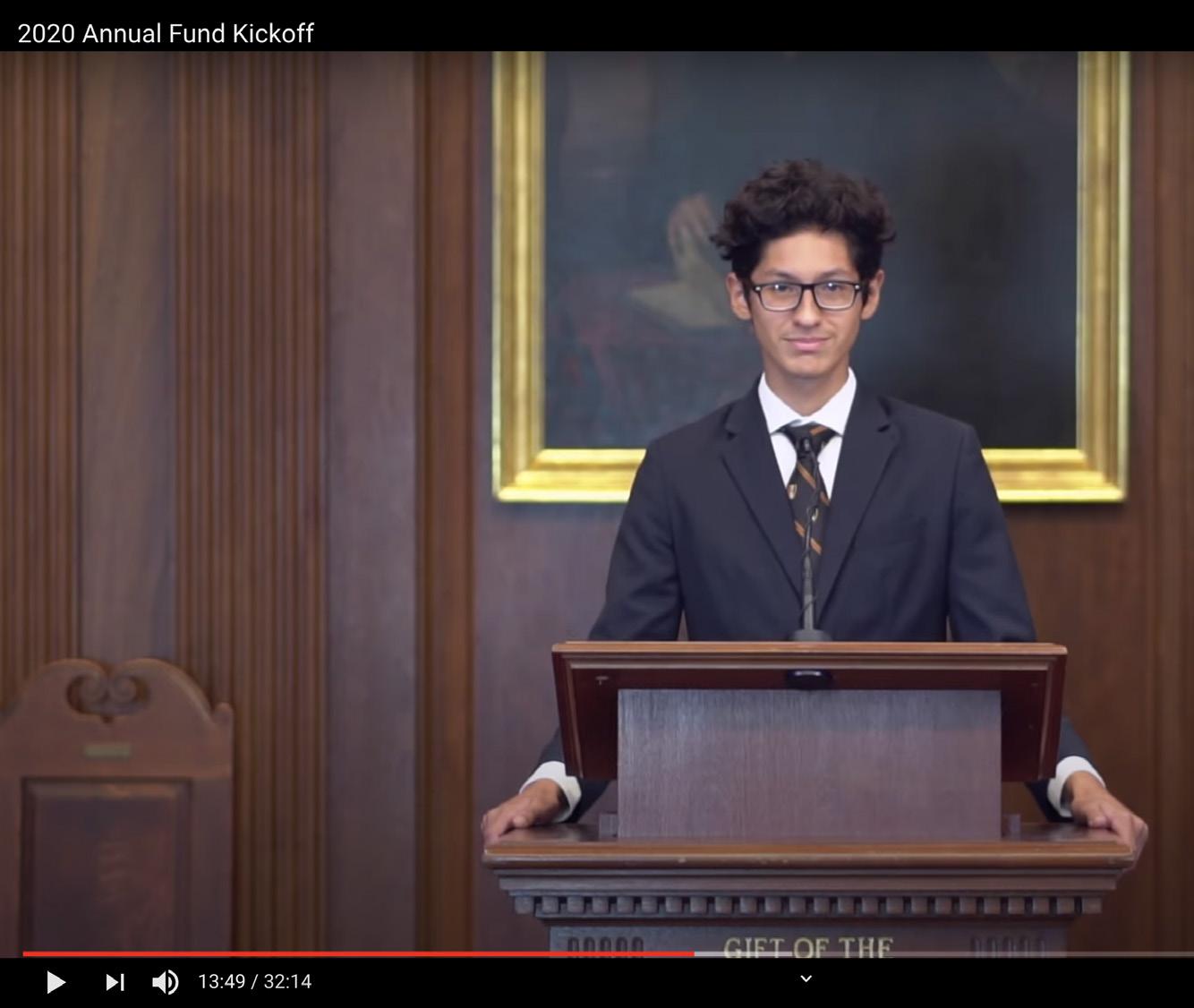

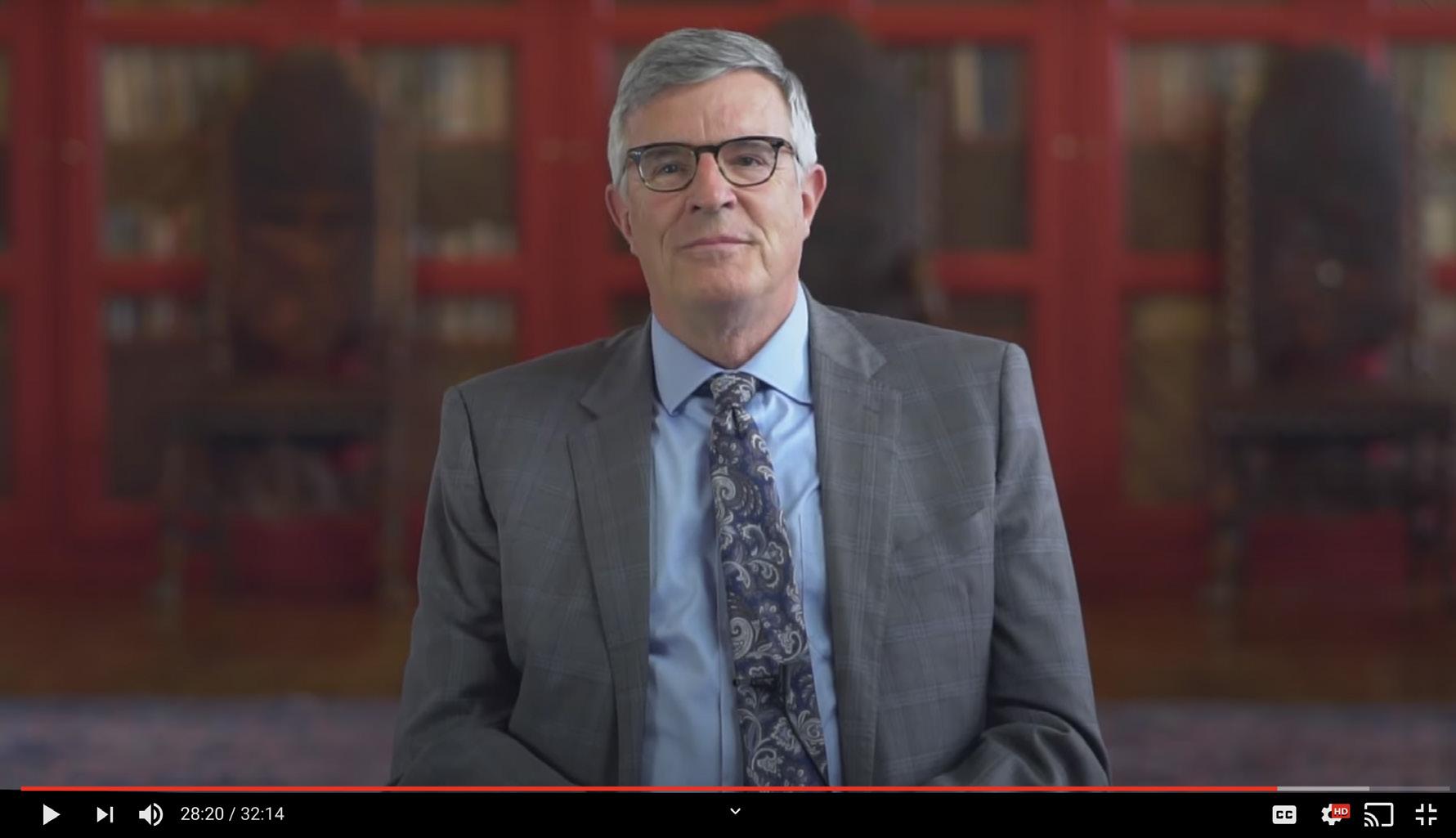
MIKE POJMAN, ASSOCIATE HEADMASTER I’m calling this talk “Aging in Place” because that is what I have been doing at Roxbury Latin for the last 40 years—and I have not regretted it for one minute. Tony Jarvis, never one to mince words, would frequently remind the boys, “This is your one and only life. Don’t screw it up!” Well, this is my one and only life, and I made up my mind long ago that I would not squander it doing something that I did not love, for a cause that I did not cherish. I believe in this school, and I believe that I am doing something worthwhile for these kids. How could I ever regret that?
Not so long ago, when my four siblings and I had gathered for Christmas dinner at my parents’ house, the conversation made its way to the subject of childrearing. I don’t remember how we got there, but I do remember that at one point my mother said, “If push ever comes to shove, I would give up my life for any one of you kids, without a moment’s hesitation.” The words were barely out of her mouth when my father said incredulously, “You would?” Now, I have no doubt that my dad, like my mother, loves us more than life itself, but at that moment…. Well, I guess it’s a mom thing. I’m devoted to these kids, and I want to believe that if I were ever to find myself in that metaphorical lifeboat, I would give up my seat for any one of them. (But I have to say, if it ever came to that, I can only hope that it will be for a kid that I actually like.)
Let me tell you why every one of these boys deserves a spot in that lifeboat: They are fun and funny—and quick. As you know, we are following a hybrid learning model this fall, with half the boys in school in “neighborhoods,” as we call them, by grade level, and the other half Zooming in from home. I was walking down the hallway the other day when I ran into three Class IV boys social distancing at the outer reaches of their neighborhood. A bit of backstory: As part of our safety protocol, every boy must take a daily health assessment and submit it to the school nurse before coming to school. Now, when I heard these boys bantering about how each of them had done on a recent quiz, I naturally said, “Are you guys comparing grades on your COVID test?” “Yeah,” said the wise guy in the group, “and I didn’t do very well. I only got a 98.6!” (Let that sink in for a moment.)
RL boys are sensitive and empathetic. Some time ago, I was feeling uncharacteristically low. I had had an off day, for a reason that I cannot now recall, but I do remember feeling quite frustrated, and more than a little inadequate. Those of us here know that in times of distress, we can count on our kids to buck us up. As I say, I don’t know why I was feeling subpar at that particular moment, but in my state of melancholy I must have projected some degree of self-doubt, because one of my students—a lovable eccentric in the group—picked up on it. “Mr. Pojman,” he said sympathetically, “you look a little down. Are you OK?” “Yes,” I responded, “it’s just one of those days.” “Don’t be too hard on yourself,” he said reassuringly, “I’m an odd person, and I like myself!” Thanks a lot, kid!
RL boys are self-aware and trusting, and they’re coachable.
This is a story from many years ago. The father of one of our seniors had died of a heart attack the previous spring. Months later, the boy was working at a Tripod layout session with several of his classmates, when he blurted out of nowhere, “Mr. Pojman, sometimes I hear my father speaking to me—in my head. Do you think that’s strange?” Startled, the other boys dropped what they were doing and looked up at him amazed. I was just as shocked, but gathering myself, I finally said, “No, Tommy, I don’t. You meant the world to your dad when he was alive. Don’t you think he will always be with you, even now that he’s gone?” Not long after, this same boy got into a battle of wills with his English teacher over a poorly written term paper. The teacher had given him the opportunity to do it over, but he refused. “Mr. Smith graded me unfairly. I’m not rewriting it,” he said defiantly, looking down from his high horse. “It was a good paper, and he just didn’t appreciate it. He’s the one in the wrong, not me.” I thought for a moment before responding. Clearly, the boy was dug in. Finally, I said, “Tommy, you once told me that you hear your father speaking to you, isn’t that right?” He nodded. “What do you think he is saying to you now?” The indignation immediately drained from the boy’s face. And after a moment he responded softly, “I think he’s saying, ‘Tommy, fix this mess.’ I’ll rewrite the paper.”
And just one more story: There was once a wonderful kid who lived near my house in Natick. He is now a fully functioning adult, and a proud alumnus. Even as a boy, he was an affable sort and very good company, so I gave him a ride to school every day for a couple of years. He was a good conversationalist, too, even at 7:30 in the morning, and he was always ready on time, so driving him was no chore—especially since almost every day he would reach into the car before getting in, handing me a warm, butteredand-jellied English muffin with his outstretched arm. I never asked for it, and he rarely made one for himself, especially during wrestling season when he was watching his weight. One Founder’s Day—a dress-up day—he climbed into the front seat wearing a tattered sport coat that may have fit him when he was a Sixie, with missing buttons and sleeves that didn’t extend past the middle of his forearms. I don’t know where he came up with that jacket—his mother would have been horrified—but clearly he was feeling his oats. I didn’t say anything at first, but as we headed down Eliot Street, I became more and more agitated. Finally, I pulled over to the side of the road and said, “Jason, I’m on the faculty of Roxbury Latin. I cannot deliver you to school looking like that. So, here’s your choice: we can go back home so you can put on a different sport coat, or I can drive you to the commuter rail, and you can take the Needham train the rest of the way in.” I half expected an argument, but nope. Without hesitation, he smiled and said, “I’ll change.” And that was that. No explanation necessary. He got it. RL boys generally get it—and usually without a fuss.
I have no doubt that you get it, too. I don’t need to lecture you about why supporting the Annual Fund is so important— more critical than ever this year when the world seems to be coming unglued, and we’re all afraid that the “new normal” may become the normal for many months to come. You already know that it’s about the boys. It has always been about the boys, and it always will be about the boys. More than ever they need the normalcy—the stability—that Roxbury Latin can provide for them. RL is not coming unglued, and with your help it will remain firmly attached to its fundamental mission: to meet these boys where they are and to take them farther—farther than they would otherwise go—so that in the years ahead, each of them will have the opportunity to make the most of his one and only life. These Roxbury Latin boys are aging in this place, year by year becoming better students, better sportsmen, better readers, better writers, better debaters, actors, and journalists. Better people. Those of us who labor in the trenches are committed to nurturing their growth throughout their four-, five-, or six-year journey here, and we are honored to be entrusted with the care and feeding of the most important thing in their parents’ lives.
It goes without saying that we can’t do any of this without you, every one of you. You are the faithful, and we depend on your generosity to make all of this possible. You have never let us down, and in this age of uncertainty, I am certain of one thing for sure: that this year, too, you will come through for us—and for them—so that 40 years from now these boys will be able to look back on their lives with the same satisfaction with which I can look back on mine—each a better man for having been a Roxbury Latin boy. //
In Memoriam
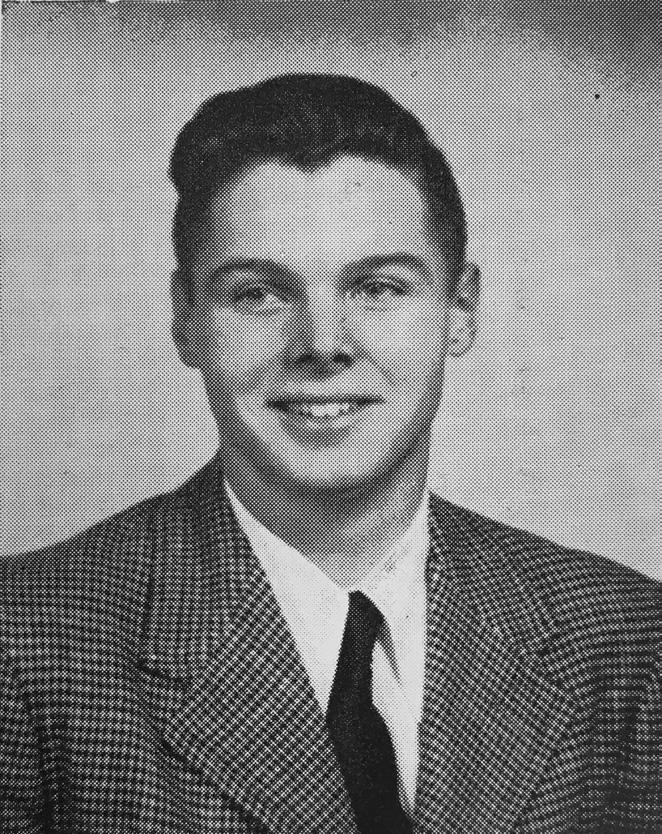
Robert “Bob” E. Gibbons ’46 died on November 9, 2020 at the age of 91. He was born on March 30, 1929, the son of Ruth Cummings and James Edmund Gibbons. He grew up on Bellevue Hill Road in West Roxbury and attended the Randall G. Morris School prior to gaining admission to Roxbury Latin.
At Roxbury Latin, Bob served as Class V President, Class II Secretary, and President of the Student Council. He was an associate editor for Tripod and won the Fowler Prize for Creative Writing in Class II. He was an active contributor to the Debate program. Bob played football at school, and during the summers he enjoyed playing golf and sailing. His final years at Roxbury Latin were tumultuous ones, as many (more than one third) of his schoolmates left school early to participate in the war effort. Nonetheless, Bob remained an active alumnus throughout his life.
Headmaster Northrop wrote, “Gibbons is an attractive person with sound judgement for one so young... [he] has developed a good deal of keenness in judgement and an unusual sureness in analysis of character. His classical studies have done much to give him excellent standards of scholarship. He will do well in college, I believe, and develop into an excellent citizen. I find him very understanding in his reactions to our best literature. He has high standards and uses them intelligently.”
Although Bob struggled academically, he recalled his time at Roxbury Latin with fondness. On one occasion, Bob was caught smoking in the boiler room. As punishment, Headmaster Northrup made him wax and polish the ancient English benches that adorn the corridor of the Perry Building with a big ball of beeswax. Bob recalled how much of a nightmare it was to wax all the crevices of the carvings in those benches, but he laughed as he remembered how his attitude shifted from one of resentment to one of pride as he completed his task. He delighted in knowing that those same benches remain in view today.
Bob matriculated at Harvard College, where he earned his AB in economics in 1950. He served in the United States Army, and married his first wife, Katherine E. Noonan, in 1956. In 1958, the couple welcomed a daughter, Lorren. Bob was predeceased by Katherine in 1984. He had a lengthy and successful career in the investment industry. For many years he worked as vice president of Foster, Dykema, Cabot & Co., a Boston-based firm. He also served as a trustee of the Cohasset Savings Bank and the director of Hyer Industries.
Bob remarried and spent many wonderful years with his wife, K. Ruth DeLay, who, along with his daughter, survives him. In his retirement, Bob took up French and Italian lessons, building on the interest in languages he developed as a student of Ancient Greek under “Doc” Van Courtlandt Elliot, Classics master at Roxbury Latin from 1939 to 1964. Bob and his wife made frequent trips abroad to Africa and Europe in retirement.
Bob was a lifelong supporter of Roxbury Latin and a proud alumnus. In 1965, he established a scholarship in memory of his late father to support financial aid at Roxbury Latin. For his service to the school, Bob was awarded the Wellington Prize in 1971. Subsequently, from 1979 to 1984, Bob served in a variety of capacities as a Trustee at Roxbury Latin. Notably, Bob was an inaugural member of the Thomas Bell Society, providing in his estate planning for the support of Alma Mater.
Peter A. Ulin ’49, of West Newton, died at home on November 5, 2020 of Parkinson’s and dementia at the age of 89. He was born on December 20, 1930, the son of Rebecca Cantarow and Benjamin Ulin. Peter grew up in Chestnut Hill and attended the Weeks Junior High School in Newton Centre before gaining admission to Roxbury Latin.
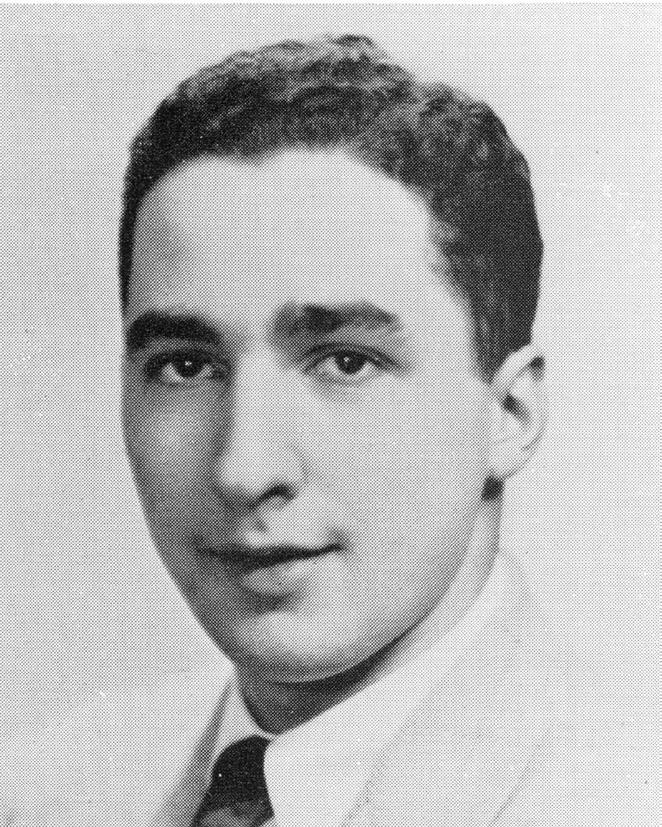
Peter’s older brother, Jeremy Ulin, was a member of RL’s Class of 1946.
Peter was broadly involved in school life while a student at Roxbury Latin. Beginning as a Sixie, he was a class reporter for Tripod. He participated in the school spelling contests and the play. As a sophomore he also sang in the Glee Club, debated, and played baseball. As a member of Class II, Peter worked on the Prom Committee, served on the Student Council, and assisted as an usher for the school play. He also contributed on the football, tennis, and baseball teams. In Class I, he was the president of Debate and staffed Tripod and the Yearbook.
In Peter’s college letter, Headmaster Weed wrote, “This boy is distinctly able. He absorbs ideas readily but accepts nothing without personal evaluation. This acceptance with his mind, rather than on faith, also causes his rejection of many conventional views. He has proved a fair athlete, a good debater, something of an organizer.” Headmaster Weed further lauded Peter as a “sound, thoughtful, and imaginative” student. Peter was chosen by his peers to deliver the valedictory address at graduation. A half century later, Peter reflected in an alumni survey, “My six years at RLS were the most formative of my life.” He wrote, “RLS taught me the virtue and rigor of the Classics and imbedded in me the desirability of a totally mixed economic and social group of school mates… the older I get, the smarter I think my parents were to send me to RLS—and the more I appreciate those at the school who taught me.”
Peter followed in his older brother’s footsteps and matriculated at Harvard College, where he studied government and earned his AB in 1953. Subsequently, he attended Columbia’s Graduate School of Business, where he earned his MBA in 1954. He then served for three years in the United States Army, during which time he was stationed in Tokyo. In 1958, Peter married Bonnie Handmaker, with whom he shared 62 loving years of marriage.
After a few years spent running the family business in retail men’s stores, Peter worked on Wall Street for several years. In the early 1980s, Peter worked as Vice President in Corporate Finance and Director of Mergers and Acquisitions in the Northeast for E.F. Hutton & Company. He was Managing Director for Ulin, Morton, Bradley & Welling, Inc. from 1984 to 1990, and later Managing Director at Advest Inc. from 1990 to 1992. Peter and Nicholas Holland later founded their corporate finance firm, Ulin and Holland, in Boston specializing in mergers and acquisitions. In retirement, Peter served on the boards of Jewish Community Housing for the Elderly and Beth Israel Hospital, among others. Peter loved volunteering, and in retirement he worked as teaching assistant at the Angier School in Waban. Peter was a published columnist, loved to discover new restaurants and bakeries, cooked avidly, and traveled the world with his wife. His favorite saying was “Life is uncertain. Eat dessert first.”
He is remembered for his quick wit, generous mentoring, fine character, and deep devotion to his family and friends. A private graveside service was held at Temple Israel Cemetery in Wakefield. In addition to his beloved wife, Peter is survived by his daughter, son, daughterin-law, and two grandchildren. Charles “Charlie” F. Barry ’51 died on November 13, 2020 at the age of 88. Born May 5, 1932, son of Virginia White and Charles Barry, Charlie attended the Randall G. Morris School in West Roxbury prior to gaining admission to Roxbury Latin.
As a schoolboy, Charlie loved sports and participated in football, baseball, hockey, tennis, and wrestling. He also sang in the Glee Club and participated in the Camera Club. Although he left Roxbury Latin in his Class II year, Charlie always considered himself a member of the Class of ’51. He attended reunions and stayed in touch with classmates for many decades.
Charlie attended Massachusetts Maritime Academy, and after graduation served as an officer in the United States Navy for five years. He subsequently worked in sales management at IBM for 30 years before retiring to Dawson County, Georgia. Charlie was a mentor in Dawson County Schools for many years and participated as a member of the Dawson County Lions Club, where he held several offices and was the recipient of many awards. He spent many years
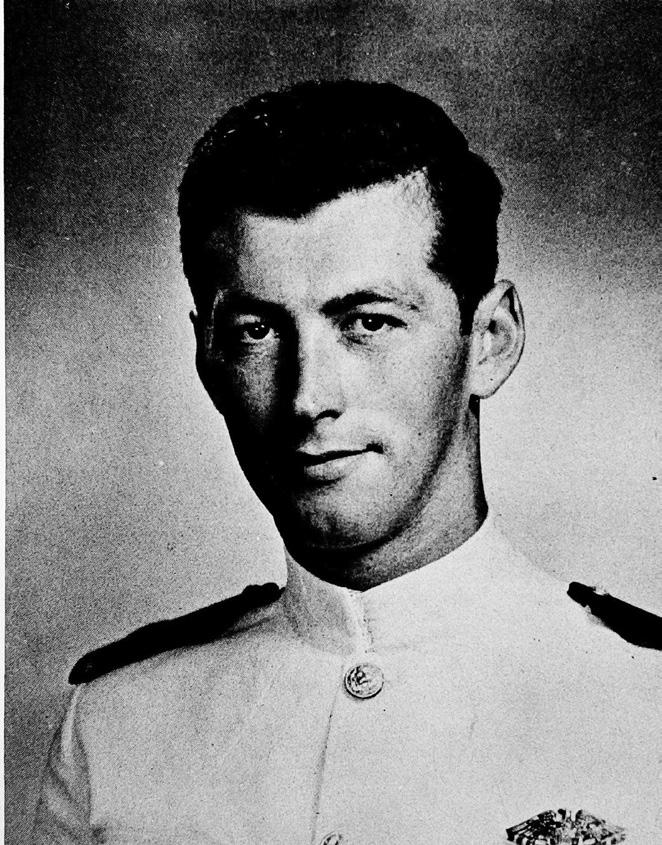
©1954 Mass Maritime Academy



